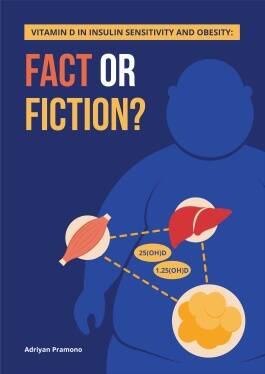
Vitamin D in insulin sensitivity and obesity:
FACT OR FICTION?
Currently, the global prevalence of obesity has doubled over decades across socio-economic and demographic status. At the same time, vitamin D insufficiency and deficiency are major public health issue worldwide, where the prevalence of vitamin D deficiency was estimated high in obesity regardless of ethnicity, age and sex. Evidence from observational studies suggests a negative correlation between body mass index (BMI) and circulating vitamin D 25(OH)D3 levels. Up to now, the vitamin D status in the general population is based on circulating vitamin D 25(OH)D3 (inactive metabolite) concentrations. Furthermore, vitamin D deficiency has also been reported to relate to whole-body insulin resistance. Of note, the development of insulin resistance is caused by a complex inter-organ crosstalk, including several insulin sensitive tissues such as the liver, the skeletal muscle, and the adipose tissue (AT). In this thesis, we aimed to investigate the link between vitamin D status and (tissue-specific) insulin sensitivity in human obesity.
Adriyan Pramono, August 28th 2020

